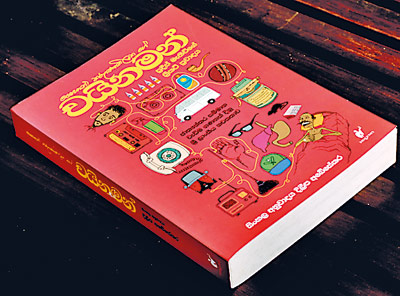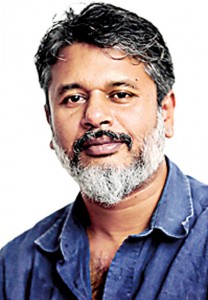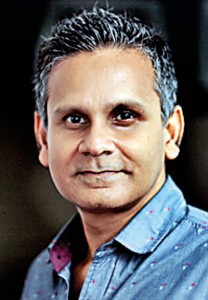Finding WG’s voice
On most evenings, after the sun wearily set over traffic-choked roads in Colombo and the city began to wind down for the day, Dileepa Abeysekara would head home to immerse himself in the company of a motley crew of characters.
There was W.G. Karunasena – intrepid sports journalist with an undue fondness for arrack,his faithful sidekick -Ari Byrd, a coach with six fingers, a host of cricketers, the best of Sri Lankan bureaucracy and an elusive spin bowler.
Dileepa would pore over the pages of Chinaman, getting acquainted with the book’s colourful characters one paragraph at a time.
Darting back and forth through English and Sinhala, Dileepa toyed with the intricacies of each language, adding and shedding words as he translated the book.
A few years were spent in this linguistic exercise of retaining the authenticity and spirit of Chinaman while giving it an entirely new lease of life in Sinhala. The Sinhala version of the book was published early this year.
Author of Chinaman, Shehan Karunatilaka, had been on the lookout for a suitable Sinhala translator for a while. Both Dileepa and Shehan worked in the advertising industry and had met each other socially but had never worked in a professional capacity.
Dileepa had picked up Chinaman a while back but finally got around to reading it after Shehan broached the idea of a possible Sinhala translation.
A fulltime advertising professional, Dileepa never intended on foraying into transla

Author: Shehan
ting but he’s glad that his first translated book was Chinaman.
The story and the humour appealed to him and it was an instant attraction between the book and the soon-to-be translator.
When handing over the copious notes he had made while writing Chinaman, Shehan had one piece of advice for his translator: to find WG’s voice.
While the book’s tangled plot was easy enough to capture, it was actually WG’s alcohol fermented, darkly humorous voice which was the crux of the book and would play an equally important part in the translation.
“For me also, getting WG’s voice was the big breakthrough. Before that the ideas were there and some of the characters were there.
Once the voice came (and to tell it through this drunken perspective), that was when the novel kind of wrote itself completely,” explains Shehan adding that he’s looking into getting the book translated into Tamil as well.
Both writer and translator researched into the idiosyncrasies, mannerisms and language of a distinct brand of vintage Sri Lankan uncles to perfect WG’s voice.
After reading the first few pages, it was evident to Shehan that the translation had managed to capture the authenticity of this voice and work on the long awaited Sinhala translation finally left the starting line. “From there on, it was like I was helping WG to write his story,” reflects Dileepa.
For Dileepa, his shared experiences with Shehan (living in Sri Lanka, coming from an advertising background, being submerged in Sri Lankan politics and the way of life as well as witnessing the nineties cricket frenzy) helped in capturing the zeitgeist of the times and the dialogue.

Translator: Dileepa
There was also the Sinhala language gradations and cricketing terms to contend with. The Sinhala word for ‘fight’ for instance, differs on the age of the speaker and can be translated into ‘goriya’, ‘waliya’ or ‘gaema’.
Dileepa also notes that his father, Karunaratne Abeysekera – famed lyricist, cricket enthusiast and one of the first Sinhala commentators – also had a lingering influence on his writing.
WG’s Sinhala avatar is recognizable to his English one but is much more rough and ready and lacks the snobbery of his English counterpart.
The Sinhala translation took a year while the editing and re-drafts took a couple of more years, until it was ready for publication.
The 2008 Gratiaen Prize winning manuscript has come a long way since it was first submitted for the prize.
It was courted by international publishers, shed some weight (the Indian edition is substantially slimmer than its first edition), nonchalantly won a few prizes and has now been revived in Sinhala and with a possible Tamil translation on the cards.
Shehan also isn’t dismissive of W.G and co. entering the silver screen but muses out aloud that it would come to life, if scripted skilfully by someone with the cultural and cricketing knowledge.
These days however, Shehan has been busy writing the ending for the first draft of his new book – December is his self-imposed deadline.
The book, he explains has been hanging around for the past four years and finally began to take shape in the last two. While the editing and rewriting will take its time, Shehan seems relieved that there’s finally an end in sight.
He explains that the latest book is set in the maelstrom of the late eighties – a fascinating period for him because of its political overtones – and is a ghost story.
With the IPKF up North, the LTTE, JVP and the government counter-terror operations, the eighties were rife with anarchism and violence. To date, ghost stories haunt places of brutality in Sri Lanka and this was the initial writing impetus.
The premise of the book is if there are ghosts wherever people die unfairly- then Sri Lanka must be full of ghosts, explains Shehan.
There is no cricket in the new book but readers can expect some cameo appearances by some characters from Chinaman. “It’s a bit heavier. A little less jokes and a little less drunk people falling over in this one,” he pauses. “I’ve said too much already.”
| Meet the author and translator ‘Found in translation’ is an afternoon with author,Shehan Karunatilaka and translator, Dileepa Abeysekara in conversation with Dr.Harshana Rambukwella. The event will be held on Wednesday, December 9 from 3 – 4 p.m., followed by a Q&A and book signing. The event is hosted by the Post Graduate Institute of English of the Open University of Sri Lanka and is held at the Seminar Room, Faculty of Humanities and Social Sciences, Open University of Sri Lanka, Nawala, Nugegoda. The event is free but seating is limited. Please email: admas3pgie@ ou.ac.lk to register. |


